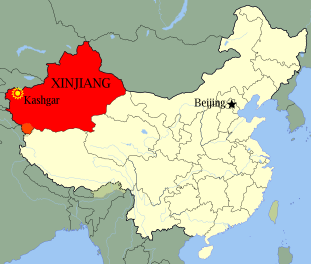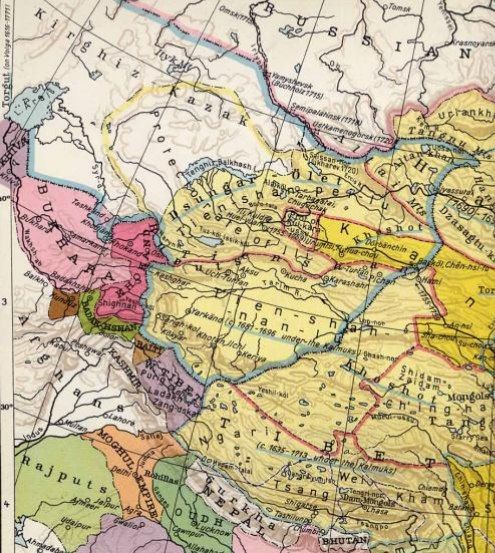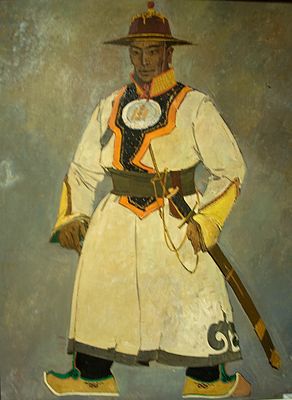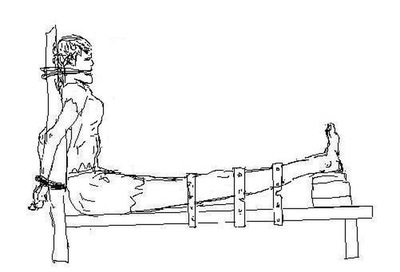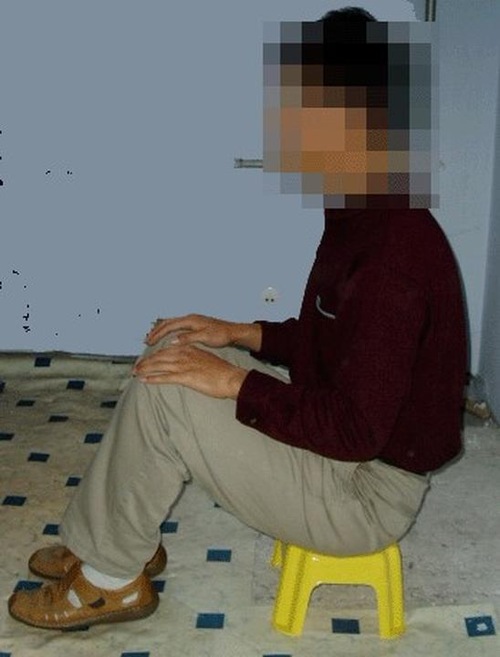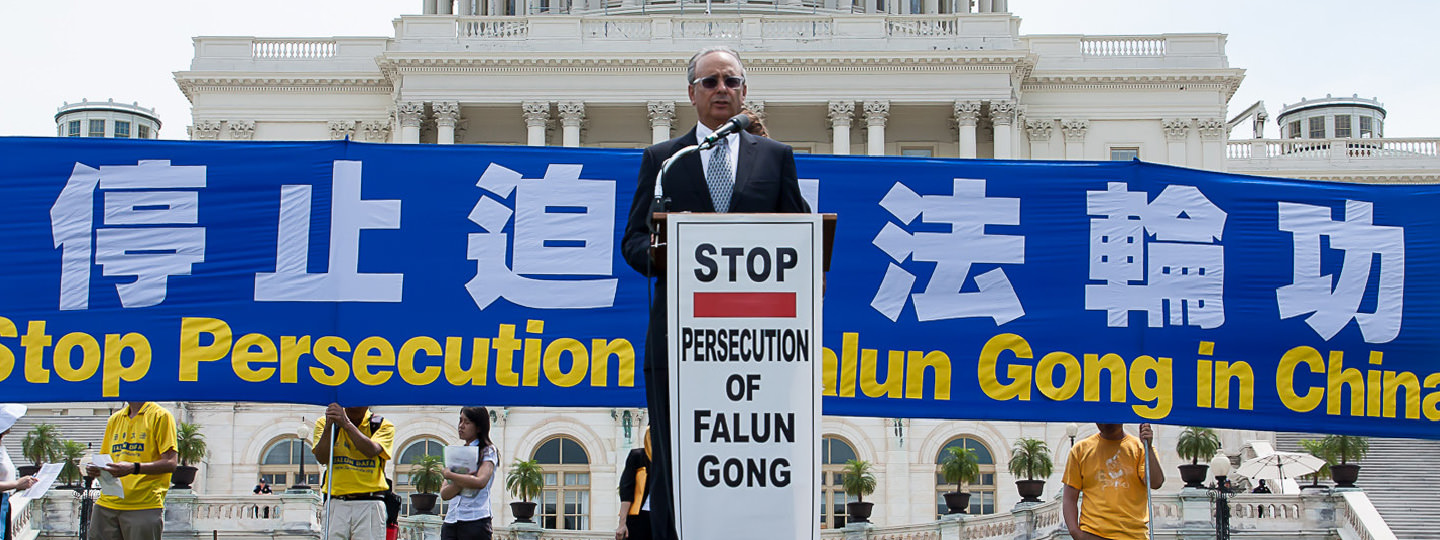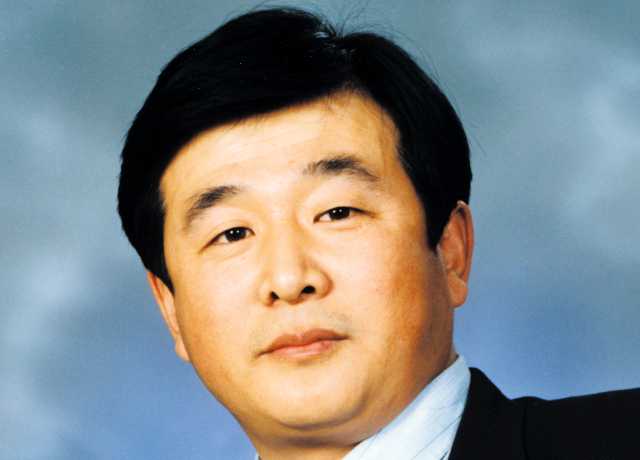Headmaster's job interview ended up in a nail chair in Chinese prison camp.
27. dec 2019, 06:39Peter Mills - interview: Amalie Hovøre
In China, about a million people are currently in reform camps. TV 2 has met one of the few prisoners who have managed to escape.
The interview hadn't even started yet, when the candidate had a black bag pulled over her head.
She had never applied for the job, and in fact, the woman inside the bag had no idea that she was about to be headhunted.
It had begun with a phone call where a man had ordered the 41-year-old school inspector to meet up at a specific address, send a message to a foreign phone number and then wait.
She did not dare to be disobedient.
The wait was long.
It was almost morning, when four armed men came in, pulled the bag over her head and led the woman into a car.
After a long drive in silence, she was supposed to get a job offer she couldn't say no to.
Disappeared
The woman in the car is called Sayragul Sauytbay, and in her new job, forced confessions, constant monitoring and torn off fingernails were a part of everyday life.
A daily life that is still taking place - right now - in China, where, according to UN figures, around a million people are sitting in so-called 'Re-education camps'.
The pictures below are of prisoners who have just arrived by train to one of the camps. They were
published by activists in september 2019.
[This is a
clip from the video Woodsman posted]
Sayragul Sauytbay came to see the interior of the camps in 2017, and she is one of the few people in the West who themselves have experienced how the Chinese camp system works, and who dares to tell about it.
TV 2 has met her in Sweden, where she has been granted asylum.
Sayragul Sauytbay is an ethnic Kazakh, and belongs to the Muslim minority in the area. Before she barely got out of China, she lived in Xinjiang province, near the border with Kazakhstan.
It is today one of the world's most closed areas, where residents are being subjected to mass surveillance, and which the Chinese are
accused of committing crimes against humanity.
What crimes like this look like, Sayragul Sauytbay knows quite a bit about.
For several years she experienced, how friends and family members suddenly disappeared during the night, and a November day in 2017, she then sat there in a car herself with a black bag over her head.
Was she now also herself missing?
In fact, it was the fear of disappearing that had led her to show up at the address where the armed men had put the bag over her head.
- I thought there's no other way. I can't say no, if I say no, I'll probably disappear. Then my family can't find me, tells Sayragul Sauytbay.
The camp
After the drive, she was taken out of the car, into a building, and when the bag was pulled off, she was sitting in a small room.
- This is the Education Center, the scared woman was informed.
[
Picture: "Fence around one of the re-eduction camps. The picture is from Dabancheng. Photo: Thomas Peter / Ritzau Scanpix"]
She had no idea she had just arrived at a re-education camp.
What such a camp was really like, she didn't know either.
Sayragul Sauytbay had only heard about them from the Chinese media, who said that the camps was created to educate people, and she associated them with something peaceful.
You can see a clip from one of the Chinese films about the camps below
here.
- We didn't know it was such a scary place, Sayragul Sauytbay says.
It turned out she hadn't ended up in the camp as an ordinary prisoner.
While she was in the little closed room, the candidate was presented with the contract of employment.
Prohibited thoughts
The job was as a language teacher in one of the camps where inmates had to learn Chinese. Many Uighurs don't speak the language, but Sayragul Sauytbay does.
- It was a multi-page document. It said something about the camp rules that I should follow. And then there was a contract of employment. I had to work as a teacher, she explains
She did not dare to do anything else but sign.
- I had no choice, if you refuse or ask questions, you lose your life, says Sayragul Sauytbay.
Exactly why she was headhunted for the new job, Sayragul Sauytbay doesn't know, but she has a hunch.
She may have thought forbidden thoughts.
Sayragul Sauytbay has grown up in a muslim family in Zhaosu County, near the border to the current Kazakhstan.
Here lived Sayragul Sauytbay
[This one is different than that which appears in the article, and instead of one there are two]
When she was a child, the Muslims in the area didn't risk being picked up by the police at night.
At that time, China was still an underdeveloped country, Xinjiang province was situated in the outskirts of China, and the ethnic Chinese were not particularly interested in the area.
But that was to change.
The underground is so rich in oil that in the old days it could be picked up from cracks in the ground with buckets.
[
Picture: "Tarim oil field in the Xinjian province in 2005. Photo: China Newsphoto/Scanpix Denmark"]
For many years the remoteness of the area meant that oil was allowed to remain in the soil, but when China's economy started to grow in the 1990s, everything was going to change.
At that time, Sayragul Sauytbay was studying medicine. She got a job at a hospital, but then she changed her career and started teaching. The Chinese state trusted her, and she came to lead the running of five preschool classes.
There were more children in the province because the number of settlers was growing exponentially. Millions of ethnic Han Chinese came to work in the oil industry, and suddenly two people with different language, culture and religion had to live side by side.
The Han Chinese is the largest ethnic group in China, and the meeting between the two cultures was not going well.
[
Picture of "A Han Chinese with a club during the riots in 2009. Photo Peter Parks /Scanpix Denmark"]
In 2009, there were violent riots in the province, where Uighurs and Hankins were fighting.
In a matter of days,
according to the Chinese authorities, 197 people were killed before the Chinese military put a damper on the situation.
The ethnic unrest led many of the locals to seek community in islam, and like so many other places in the world began, the Chinese state to fear Islamic terrorism.
There were several bloody attacks and riots, including in 2014, when armed men drove two cars through a marketplace throwing explosives in the city of Urumqi.
China's response to Islamic terrorism was, among other things, a ban on headscarves and long beards.
[Text below the
picture:] "The Xinjiang province has been hit by terror several times. In 2014, 31 lost their lives, while over 90 were injured during such an attack. According to the Chinese, it was Islamic terrorism. PHOTO: Str / Scanpix Denmark"
As tensions between Han Chinese and Uighurs grew, Sayragul Sauytbay was married. She had two children, and as time passed, the little family began to dream of freer frames in neighbouring Kazakhstan.
Freer frameworks, however, were not something the Chinese state liked.
The net is tightening
In 2014, the authorities seized Sayragul Sauytbay's passport as part of an increased control of Public Employees.
The majority of the province's remaining Muslim population got their passports revoked in 2016, but right before that, Sayragul Sauytbay's husband and children succeeded in obtaining an exit visa to Kazakhstan.
She herself was waiting for a visa, while the control of the authorities was tightening up more and more.
The authorities put cameras up all over the cities, and suddenly having all the Uighurs hand over dna samples, sound samples and biometric data, so that their whereabouts could be traced - according to
Human Rights Watch.
Even going out the back door of your home could result in a police interrogation.
Officially, it was all an attempt to "remove the ideas and ideology that support terrorism", even in the propaganda films "The long battle 1-3".
This involved, among other things, the removal of mosques of Muslims and the construction of parking spaces in their cemeteries.
[Pictures
1 2 ]
In January 2017, the authorities started arresting Uighurs with family abroad.
Also Sayragul Sauytbay.
She was taken to an interrogation, where the police would know exactly where her husband and children were gone, and why they had traveled to Kazakhstan. When the interrogation was over, she was ordered to tell her husband to come home and Sayragul Sauytbay was forbidden to talk about the interrogation.
But the family did not return to China, so Sayragul Sauytbay had to go through several interrogations, and in november of 2017, she was then told to meet up at the address from which she was abducted by the four armed men.
[Picture
1,
2]
When she had signed her employment contract, she received a uniform and was taken to her new home: a tiny bedroom with concrete bed and a thin plastic mattress.
She didn't know she should be happy.
Because this was one of the good cells.
Sayragul Sauytbay found out later, that the ordinary prisoners in the camp lived within cells of 16 square meters with a small plastic bucket in the corner as a toilet.
But they weren't single cells like hers, here lived about 15 prisoners in each cell, and the rules were strict.
[Picture of place where camp is located:
2011 2019]
All prisoners were given two minutes each to go to the bathroom daily, and the plastic bucket was only emptied once a day.
If it was full, you'd have to squeeze your legs till the next day.
The prisoners were constantly chained to their hands and feet, even when they were asleep, and they were under constant surveillance.
- There were four cameras in the corners and in the middle of the ceiling, that could follow you. We were only allowed to sleep on the right side if you did not, you were brought to punishment. They could check 24 hours a day, says Sayragul Sauytbay.
The cell was even the prison sanctuary.
What the movies didn't tell you.
When they were not locked up, were the prisoners, among other things, taught in Chinese, culture, law and political ideology by Sayragul Sauytbay, but the lessons reminded most about the nursery classes, she was used to.
Here, the authorities interfered in even the slightest of details.
- I had to teach exactly as it said on the paper, and in the hours there were two armed police officers in the room says Sayragul Sauytbay.
The school day often ended with singing lessons, where prisoners had to learn the Communist songs of the regime.
Music teaching is also presented in this way in the regime's films about the camps.:
[
Link to video]
The prisoners' food was rice soup except on Fridays when pork was served, if they were lucky.
Sayragul Sauytbay ate it.
The unlucky prisoners didn't get pork - they ended up in "the black room."
- It was an area where we weren't supposed to come. There were no cameras. It was a torture area, says Sayragul Sauytbay.
The first time she saw someone going in there was in the middle of one of her classes.
- The police came and took some people away. The room wasn't far from where we lived, and for 24 hours we could hear screams and people asking for help. Strange noises came from in there, and it was a nightmare for us, say Sayragul Sauytbay.
Not everyone came back from there.
- Some disappeared, but some came back with bad injuries, some with no nails and some with bruises and red marks, telling Sayragul Sauytbay.
The victims were not allowed to talk about what had happened when they came back.
The black room
But Sayragul Sauytbay soon found out herself about what was going on inside the "black room".
She worked also as an interpreter, and an attempt to help an elderly woman in the camp went wrong.
The 84-year-old woman was arrested for having used a telephone, and Sayragul Sauytbay was asked to translate.
- She said, "I'm 84 years old and Nomad. I'm Kasakh, I live from mountain to mountain, and I've never used a phone." I was just trying to translate what she said and tell them she was innocent. That's why they took me to the black room to torture me, say Sayragul Sauytbay.
First she was electrocuted.
- They took me in and beat me with electric batons. Seeing the torture tools was so scary. There were' black chairs', they call themselves' Tiger chairs', and they're running power through them. There were chairs with nails in the side, but what scared me most was torture tools that looked like needle spikes, thin and pointy, hung up in a row.
For the next two days, there was no food or water.
When she came out for a ride in the nail chair, she felt helpless.
- Then I realized we were just some kind of living corpse, she says.
[
Video link]
But it's not the torture chamber she remembers today as the worst experience.
- One day, they took more than 100 of us to an open spot. They chose the youngest girl, she was about 20 years old, says Sayragul Sauytbay.
The girl was pulled out in front of the others.
- Then she stood there before us, and even though she had really done nothing wrong, she confessed all her sins, errors and crimes crying. They forced her to say it with her own mouth, says Sayragul Sauytbay.
Then came the punishment.
In front of all of us, the Chinese jailers took turns to rape her one by one. We were powerless, no man or woman could say anything to stop them. It is something I cannot forget how we were powerless victims, she says.
[Five second
video clip that show the facial expression of Sayragul Sauytbay.]
If you showed emotions on an occasion like this, you risked being taken for punishment.
Sayragul Sauytbay had to suppress her emotions, and she suffered from insomnia in the camp. She says she lost eight kilos after the gang rape incident.
Back to reality
According to Sayragul Sauytbay, the prisoners in her camp were only behind the fence because of their ethnic roots.
- What we did wrong was we weren't Hann Chinese. To be Uighur or Kasakh, that is wrong, she says.
Just listening to the region's folk music could be enough to end up in a camp, says Sayragul Sauytbay.
She's certain that she ended up there herself because her family had moved to Kazakhstan.
But one day in March 2018, it was over.
The police came and took her.
[
Picture: "A tower for the guards at a re-eduction camp in Hatan. Photo Greg Baker /Ritzau Scanpix."]
After a drive with a bag over her head, she found herself again in front of her home.
- They took the contract I signed at the beginning and said, "Look, anything you tell, you'll be punished for it. You can't say anything. As of tomorrow, you can go back to work, and you can say you've been to an educational conference," says Sayragul Sauytbay.
The next morning, she was back at work. No one asked where she'd been, and she tells herself she didn't say anything about the camp.
And yet the authorities weren't done with her.
After just a few days of freedom, her job was given to someone else, and Sayragul Sauytbay was taken back to interrogation.
- They said I had two faces and had been dishonest. I had to get back to camp. Not as a teacher, but as a prisoner for one or three years, she says.
Escape through the neighbor's garden
This time, however, Sayragul Sauytbay was given a few days to hand over the tasks to her successor. While it was going on, she could live at home under the supervision of the Chinese authorities.
- I figured if I go back in there as a prisoner, I'm not getting out alive. It was already two and a half years ago, I had seen my children, and then one of them just a baby, so I thought that I had to find a way to give my child a hug, say Sayragul Sauytbay.
She decided to cheat the Chinese surveillance.
[Picture
link: "There is massive video surveillance in the Xinjiang province - here it is outside the mosque in the city of Urumqi. Photo: Peter Parks / Scanpix Denmark"}
I created a scene, says Sayragul Sauytbay,
The windows of her home were wide open, so no one could doubt she was cooking.
Then she ran away.
Out through a window and in through the neighbor's garden.
From there she took a taxi to the border to Kazakhstan, where she sneaked out of China and shortly after was reunited with his children in the neighboring country.
- It was midnight when I arrived. It was my greatest desire to cuddle them again just once in my life, and I did say Sayragul Sauytbay.
[
Picture: "Sayragul Sauytbay whent she waited for asylum in Kasakhstan. Photo: Ruslan Pryanikov /Scanpic Denmark"]
She had fled without passports, money and personal papers, and meeting with the authorities of Kazakhstan sent her nine months in jail, before Sweden offered her asylum.
- I don't know about my own future, but my kids are safe here, she says.
According to the Chinese Embassy in Sweden, we shouldn't believe her story. The Chinese say Sayragul Sauytbay has never worked in a re-education camp and has never been detained until she left China illegally. On the other hand, she's been charged with a corruption case.
- They try in different ways to silence me. Now that they've found out they can't stop me, they'll say I'm lying. She says that's the Chinese way to do it.
Her relatives still live in the Xinjiang province, and she has heard that her father and sister have been put in the camps.
Yet she will not be forced to remain silent.
- I know it. I saw it, and it's happening to us. I can do something for them. I felt powerless, but now I can talk. Why shouldn't I do that, she says.
She knows the Chinese won't offer her a new job if she ever comes back.
- I think they're gonna cut me up, she says.
See the mini-documentary ' Caught in China's secret camps-torture or education?'on TV 2 PLAY.




